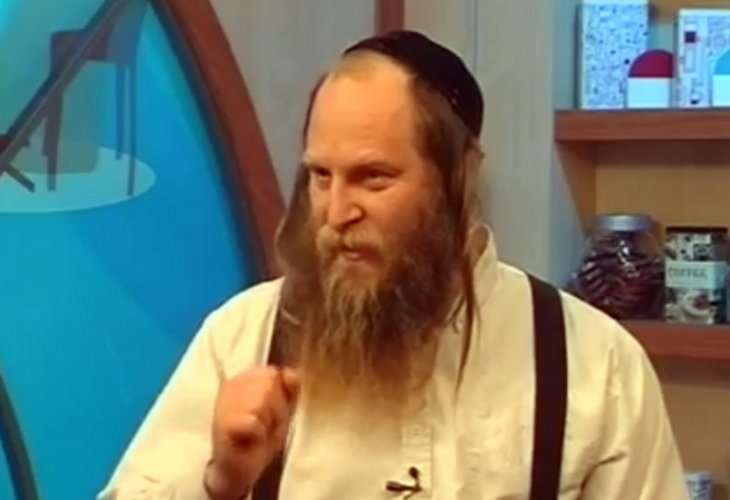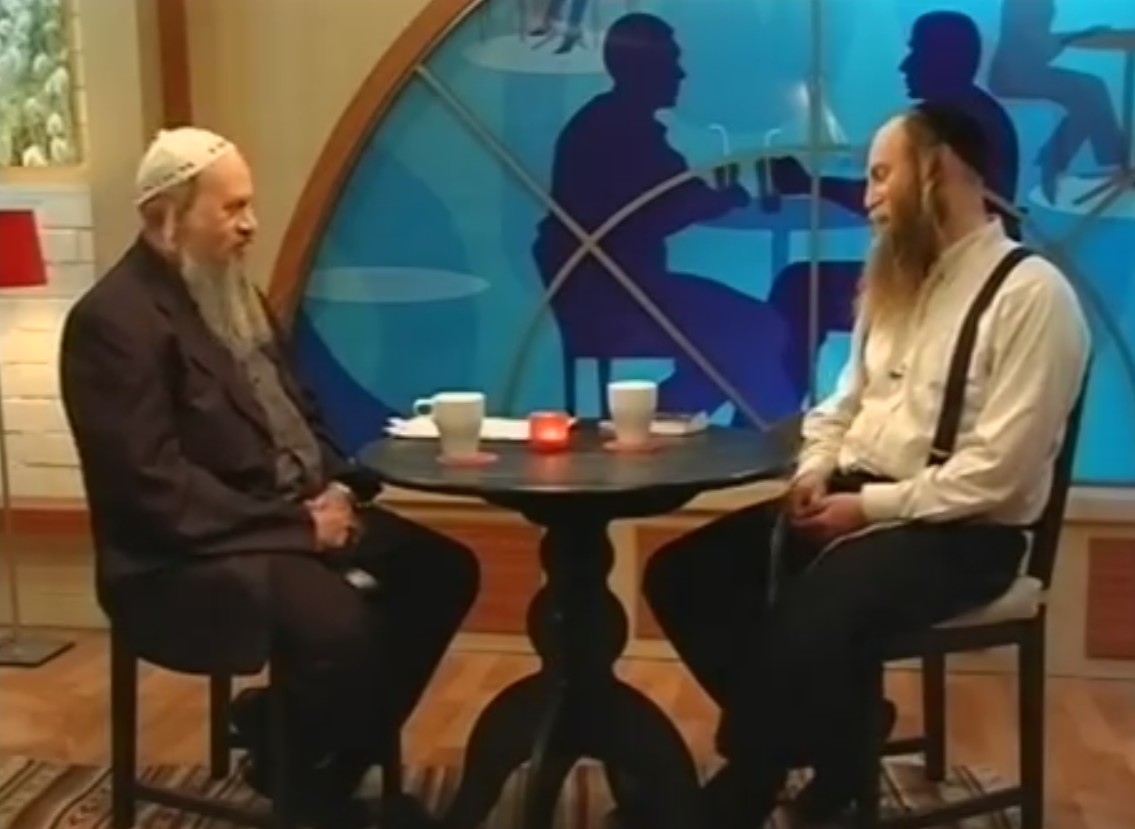Dr. Tzur Basseraman on the Path to Teshuva: "When I Entered Weizmann Institute with a Kippah, I Thought I Would Faint"
The fascinating story of Dr. Tzur Basseraman - a doctor of neuroimmunology, psychotherapist, and senior lecturer in biology at Machon Lev - navigates through significant milestones towards a life of Torah and mitzvot: from the moment he sat in class with both the Tanakh and the New Testament, to surviving a military plane crash, and to standing at the Weizmann Institute with a kippah. Read the intriguing interview, which touches on his unique therapeutic approach.
 Dr. Tzur Basseraman
Dr. Tzur Basseraman It all started when he was 11 years old. Dr. Tzur Basseraman had just immigrated to Israel from France with his parents, with no knowledge about Judaism. So much so that for the first Torah class, he brought two books - the Tanakh and the New Testament. "It seemed like one entity to me. Just as the New Testament meant nothing to me, so did the Torah. The wall between us was then very solid and high," recalls Dr. Basseraman (51), married, father of five children, and a new grandfather.
However, two years later, during his Bar Mitzvah, he began to feel how that wall was slowly cracking. "I remember putting on tefillin, and even then I felt there was a deep truth here. There was a moment of deep connection with Hashem - but at some point, it just ended."
But that was definitely not the end. Hashem chooses His soldiers one by one, giving him, in his words, "a gift to experience things truthfully and always seek the truth behind them," he explains. It took a few good years, but already in the first year in the army, during the flight course he participated in, the transformation occurred. "We were three good friends planning a vacation - something that didn't happen often. As cadets in the flight course, we rented a plane to fly ourselves, and... when everything was ready, we got in the car to drive to the airport in Herzelia and suddenly - I don't know where it came from - I heard myself tell them: 'Let me off here.'"
Basseraman still doesn't know how to explain that overwhelming feeling. "It started as a jumble of things I was saying to myself, and turned into an internal conversation whose meaning I couldn't understand. All I remember is that I was determined to get out of the car, immediately."
The unfortunate accident he miraculously survived, which led him to leave the flight course
To provide some context - the friends had prepared for this vacation for no less than three months, but Basseraman felt he simply couldn't go on.
"They let me off at the field, not before one of them said to me: 'Look up. We’ll be there, and you’ll be here.' They looked at me as if I had fallen from the moon, and we parted ways. The truth is, at that moment, I did not understand what was happening with me and why I decided what I did."
 (Illustration Photo: shutterstock)
(Illustration Photo: shutterstock)Only when he reached Haifa - was the scope of the miracle evident. "Tragically, as soon as I arrived in Haifa, I was informed that they had crashed. That news shattered me, and when I returned to the base - I knew I was leaving the course."
Years passed, and Basseraman began studying for a bachelor's degree in physics and biology at the Hebrew University, completed a doctorate in neuroimmunology, and after a research period at Tel HaShomer in the field of multiple sclerosis - he became a senior lecturer in biology at Machon Lev.
One of the most formative moments he recalls from his academic studies was when a lecturer was teaching Einstein's theory of relativity. "I remember that everyone around me had a very deep look in their eyes, and I just looked at them and said: 'Okay, so what! How does this concern me as a Jew?'"
"I very much wanted to understand who I am, and what life is. This is also one of the reasons I chose to study biology. However, the more I studied, the more I realized that all this wisdom is like describing an instrument, a wonderful vehicle or creature. It always describes the how, but not the why and who – and that was my main problem. To this day, when I lecture to my students, I explain that the perfection of creation and the harmony between all things that operate here cannot truly be quantified and reduced into words."
So what does one do when the desire to know burns inside but only the "how" is known on the other hand? Quite simply. Enroll in psychology and Jewish studies at Bar Ilan - just to understand the why. And there his true inner journey began. "I often found myself wrestling with tough questions, clashing between intellect and emotion," he recalls. "As free-choice beings, I don't believe there is a person in the world without very real and very difficult questions to resolve. With so many factions and truths, you ask yourself – where is the real truth? Today, after the process I've been through and continue to go through, I can accept the lack of understanding, something that as a researcher and lecturer was unacceptable."
To this day, explaining the truths of the Torah is difficult for me, but in this case, for example, Rabbi Nachman of Breslov has given me tools to cope. Tools that allow me to enter a world of emunah simply, and do what I need to do while agreeing not to know. And this is a very great art, which one must work on all one's life. Agreeing that we don’t know and don’t have to know everything."
"Do you really think a person is more than a collection of molecules?"
When he understood part of the "why," he gradually decided to take on more and more mitzvot identified with Judaism. "Initially, I only wore a tallit katan and a cap - because I wasn’t yet ready for a head covering," Basseraman shares. "While working on my doctorate at the Weizmann Institute, I preferred to pray with the minyan of the employees and not with the professors, and when I finally understood that I wanted to wear a kippah, it was a very big challenge for me.
"I remember entering the Weizmann Institute with a knitted kippah on my head, and the cap disappeared. I thought I would faint from the way they looked at me... but I somehow strengthened myself that this was my truth, and I am allowed to express it freely. Yes, even at the Weizmann Institute. Until one lecturer took me aside and asked with a kind of smugness: "Do you really think a person is more than a collection of molecules?" I found myself telling him: "Absolutely yes," and continued with the kippah ever since."
 (Photo: shutterstock)
(Photo: shutterstock)Alongside his religious lifestyle, Dr. Basseraman today serves in various professional roles: psychotherapist, couple and individual therapist, treating stress, anxiety, obsessive disorders, and more.
Does the psychotherapy method you practice address issues such as anxiety and depression, and if so - how does it address them?
"Certainly yes. However, treatment for anxiety and depression in this way differs from other methods. Unlike many other methods, treatment in these areas in the way I treat does not focus on the past of the person but provides a foundation from which a person can grow and develop coping tools. In the first stage, I identify what are the points that bring life to the person, and in the second stage, employ empowerment techniques, connecting to the thriving resources present in every person.
"For example, one method I use is biofeedback, where the patient is connected to computerized electronic equipment, which reports changes occurring in their body at a given time, such as sweating, heart rate, and breathing rate. In other words, it’s like a mirror that allows a person to see what physical state they are in and to achieve control and moderation of their emotional intensity. Although these processes are often complex and take quite some time, through this reflection, a person starts to achieve a kind of self-awareness. While they may not be able to change the reality itself, they can learn the tools at their disposal to adapt to this reality in a healthy, correct way that does not harm them, and may even help them grow."
"Humility is the Difference Between Classical Psychology and Jewish Psychology"
For over 15 years, Basseraman has been practicing this method, and one of the most important insights he has learned is that the therapist is essentially just a tool, and the client is the one who conducts the therapy. Therefore, when I ask who might be suitable for such treatment, Basseraman replies that "mainly someone with broad self-reflection and natural curiosity to know. It’s also important that the person doesn’t come 'full' and 'caught' in what they already know, especially if they’ve tried other methods."
Does this method address various traumas as well?
"The word trauma is very misleading. It was once customary to associate it with a single, large negative event in the patient's life, like an accident or loss of a dear person. Today, it's understood that trauma can also be caused by prolonged exposure to poisonous environments - and this is much more complicated to deal with. A child growing up in an environment where warmth and love are absent, for example, creates a process in the psyche with reactions such as dissociation - meaning total disconnection of awareness from feelings, sensations, memories, and even thoughts. Therefore, trauma is rarely a one-time event."

In this crazy era where one thing follows another, how can one pause for a moment and even identify if there’s a problem? We are constantly racing for solutions, and not always truly understanding what the soul within us lacks.
"You raise a very important issue. We are in a very problematic generation today, because it is surrounded by many available and strong substitutes for actual needs, many pain relievers such as chocolate, coffee, good music, and others which mislead us from understanding that we have a problem. Someone might go through entire conversations about food, not understanding they have an issue with food desires. And that is one of the hurdles therapists are asked to overcome - bringing their clients to the awareness that there is indeed a problem. First to understand there is a problem, and then to try and solve it.
"The truth is most of us don't know how to stop this race, but to start taking care of ourselves seriously, we have to learn to stop and observe. There are today amazing tools for contemplation, one of which is called MINDFULNESS. This is a method that actually allows someone to observe inwardly in a non-judgmental way, without the interference of emotions. Today, in my opinion, it's a tool needed by all of us because it teaches that we shouldn't repel and cover up the feelings that rise and appear but to observe them with informed and embracing consideration.
"That said, I do think processes like these should be done with professional guidance, as during them hard things can come up. When you go through it with a therapist, you learn how to look at these things in an embracing manner - touching but not touching, to be present in these feelings, without letting them overwhelm me. This is exactly the difference between a child and an adult."
When I asked how to choose a therapist among the various methods available, Dr. Basseraman replied that this is essentially the hard part because what works for one may not work for the other. And no, in his opinion, it's not possible to decide based on recommendations or a therapist famous because of X things. "Sometimes the young, inexperienced therapist will prove better than the 'polished' but weary one," he says. "One of the things I, for example, greatly look for in therapists, is humility, and that's the difference between classical psychology and Jewish psychology. In my view, a good therapist should have much humility, optimism, resilience, and loyalty, but ultimately - there's no doubt that the chemistry between the therapist and the client is like a match, and there must be mutual favor."
Another tool that Basseraman recommends to all his clients, and without which it is almost impossible to start any internal process, is hitbodedut. "When you go out into the field, you first learn how to be silent. After learning to be silent, you slowly start speaking to the point of the soul, of the divine connection, of your truth. This connection to yourself, to emunah and your relationship with Hashem - has no equal, and cannot be replaced by any other means. From the field, people come out different, point."
Watch the interview of Adi Ran with Dr. Tzur Basseraman:

